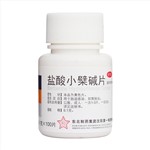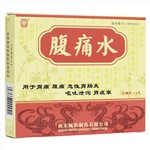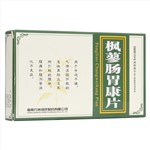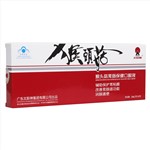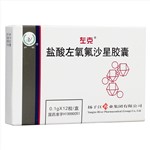近日,从中国农业科学院哈尔滨兽医研究所传出喜讯,该所冯力研究员领衔的猪消化道传染病创新团队在研究中获得重要发现:猪传染性胃肠炎病毒感染可诱导靶细胞自噬,继而抑制病毒的复制。该研究结果发表在近期国际知名期刊《Scientific Reports》(科学通报)上,相关链接:http://www.ncbi.nlm.nih.gov/pubmed/27029407。
清热利湿,行气。用于大肠湿热所致的泄泻,症见大便泄泻、腹痛腹胀;急慢性胃肠炎、腹泻、小儿消化不良见上述证候者。
健客价: ¥17温中祛寒,健脾止泻。用于中焦虚寒,寒温内盛,脘腹冷痛,大稀溏或泄泻;慢性胃肠炎,慢性结肠炎见上述证候者。
健客价: ¥25用于肠道感染,如胃肠炎。
健客价: ¥15理气健胃,除湿化滞。用于中运不健、气滞湿困而致的急性胃肠炎及其所引起的腹胀、腹痛和腹泻等消化不良症。
健客价: ¥10清热利湿,行气。用于大肠湿热所致的泄泻,症见大便泄泻、腹痛腹胀;急慢性胃肠炎、腹泻、小儿消化不良见上述症候者。
健客价: ¥30温中止痛,解毒辟秽,和胃止泻。用于胃痛,腹痛,恶心腹胀,呕吐泄泻,急性胃肠炎,胃痉挛。
健客价: ¥7理气健胃,除湿化滞。用于中运不健、气滞湿困而致的急性胃肠炎及其所引起的腹胀、腹痛和腹泻等消化不良症。
健客价: ¥6理气健胃,除湿化滞。用于中运不健、气滞湿困而致的急性胃肠炎及其所引起的腹胀、腹痛和腹泻等消化不良症。
健客价: ¥6芳香化浊,理气止痛,健胃导滞。用于消化不良引起的腹泻,肠炎,菌痢,脘腹胀满,腹痛,食积乳积。
健客价: ¥35本品适用于敏感细菌所引起的下列轻、中度感染: 1.呼吸系统感染:急性窦炎、慢性支气管炎急性发作、社区获得性肺炎; 2.泌尿系统感染:急性肾盂肾炎、复杂性尿路感染等; 3.生殖系统感染:前列腺炎、附睾炎、宫腔感染、子宫附件炎、盆腔炎(疑有厌氧菌感染时可合用甲硝唑); 4.皮肤软组织感染:传染性脓疱病、蜂窝组织炎、淋巴管(结)炎、皮下脓肿、肛周脓肿等; 5.肠道感染:细菌性痢疾、感染性肠
健客价: ¥55益气活血,理气通下。用于胃肠手术后腹胀、胃肠活动减弱,症见体乏气短、腕腹胀满、大便不下;亦可用于老年性便秘及虚性便秘。
健客价: ¥55本品不能代替药物
健客价: ¥28本品适用于有胃肠道功能或部分胃肠道功能,而不能或不愿进食足够数量的常规食物以满足机体营养需求的应进行肠内营养治疗的病人,主要用于: 1.厌食和其相关的疾病; -因代谢应激,如创伤或烧伤而引起的食欲不振 -神经性/精神性疾病或损伤 - 意识障碍 - 心/肺疾病的恶病质 癌性恶病质和肿瘤治疗的后期 - 艾滋病病毒感染/艾滋病。 2.机械性胃肠道功能紊乱; - 颌面部损伤
健客价: ¥68百普素适用于胃肠道功能有损失,而不能或不愿进食足够数量的常规食物以满足机体营养需求的应进行肠内营养治疗的病人,主要用于: 1.代谢性胃肠道功能障碍:胰腺炎、感染性肠道疾病、放射性肠炎及化疗、肠瘘、短肠综合症、艾滋病病毒感染/艾滋病;2.危重疾病:严重烧伤、创伤、脓毒症、大手术后的恢复期;3.营养不良病人的手术前喂养;4.肠道准备。百普素能用于糖尿病病人
健客价: ¥691.呼吸系统感染:急性支气管炎、慢性支气管炎急性发作、弥漫性细支气管炎、支气管扩张合并感染、肺炎、扁桃体炎(扁桃体周围脓肿); 2.泌尿系统感染:肾盂肾炎、复杂性尿路感染等; 3.生殖系统感染:急性前列腺炎、急性副睾炎、宫腔感染、子宫附件炎、盆腔炎(疑有厌氧菌感染时可合用甲硝唑); 4.皮肤软组织感染:传染性脓疱病、蜂窝组织炎、淋巴管(结)炎、皮下脓肿、肛周脓肿等; 5.肠道感染:细菌
健客价: ¥4.5清热利湿,行气。用于大肠湿热所致的泄泻,症见大便泄泻、腹痛腹胀;急慢性肠胃炎、腹泻、小儿消化不良见上述证候者。
健客价: ¥19本品适用于敏感细菌引起的下列轻重感染: 1、呼吸系统感染:急性支气管炎、慢性支气管炎急性发作、弥漫性细支气管炎、支气管扩张合; 2、并感染、肺炎、扁桃体炎(扁桃体周围脓肿); 3、泌尿系统感染:肾盂肾炎、复杂性尿路感染等; 4、生殖系统感染:急性前列腺炎、急性副睾炎、宫腔感染、子宫附件炎、盆腔炎(疑有厌氧菌感染时可合用甲硝唑); 5、皮肤软组织感染:传染性脓疱病、蜂窝组织炎、淋巴管(
健客价: ¥15美沙拉秦栓(天宏):用于溃疡性结肠炎。一些病例在医生建议下可合用美沙拉秦片剂。 美沙拉秦缓释颗粒(艾迪莎):溃疡性结肠炎的急性发作 ;防止复发。频繁发病的克罗恩病病人,预防急性发作。
健客价: ¥710本品适用于敏感细菌引起的下列轻、中度感染; 1.呼吸系统感染:急性支气管炎,慢性支气管炎急性发作、弥漫性细支气管炎、支气管扩张合并感染、肺炎、扁桃体炎(扁桃体周围脓肿); 2.泌尿系统感染:肾盂肾炎、复杂性尿路感染等; 3.生殖系统感染:急性前列腺炎、急性副睾炎、宫腔感染、子宫附件炎、盆腔炎(疑有厌氧菌感染时可合用甲硝唑); 4.皮肤软组织感染:传染性脓疱病、蜂窝组织炎、淋巴管(结)炎
健客价: ¥5.6本品适用于敏感细菌所引起的下列轻、中度感染: 呼吸系统感染:急性支气管炎、慢性支气管炎、慢性支气管炎急性发作、弥漫性支气管炎、支气管扩张合并感染、肺炎、咽喉炎、扁桃体炎(扁桃体周围脓肿); 泌尿系统感染:肾盂肾炎、复杂性尿路感染等; 生殖系统感染:急性前列腺炎、急性附睾炎、宫腔感染、子宫附件炎、盆腔炎(疑有厌氧菌感染时可合用甲硝唑); 皮肤软组织感染:传染性脓疱病、蜂窝组织炎、淋巴管(结)
健客价: ¥14.9肠道易激综合征,结肠痉挛,胃肠炎、胃、十二指肠及食道疾病,内窥镜检查准备(食道镜、胃镜、十二指肠镜及直肠镜)。
健客价: ¥54理气健胃,除湿化滞。用于中运不健、气滞湿困而致的急性胃肠炎及其所引起的腹胀、腹痛和腹泻等消化不良症。
健客价: ¥29.5本品适用于敏感细菌所引起的下列轻、中度感染; 呼吸系统感染:急性支气管炎、慢性支气管炎急性发作、弥漫性细支气管炎、支气管扩张合并感染、肺炎、咽喉炎、扁桃体炎(扁桃体周围脓肿); 泌尿系统感染:肾盂肾炎、复杂性尿路感染等; 生殖系统感染:急性前列腺炎、急性副睾炎、宫腔感染、子宫附件炎、盆腔炎(疑有厌氧菌感染时可合用甲硝唑); 皮肤软组织感染:传染性脓疱病、峰窝组织炎、淋巴管(结)炎、皮下
健客价: ¥7解表化湿,理气和中。用于外感风寒、内伤湿滞或夏伤暑湿所致的感冒头痛昏重、胸膈痞闷、脘腹胀痛、呕吐泄泻;胃肠型感冒见上述证候者。
健客价: ¥4


